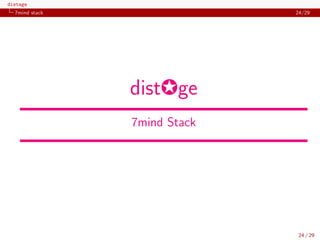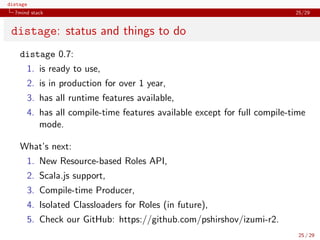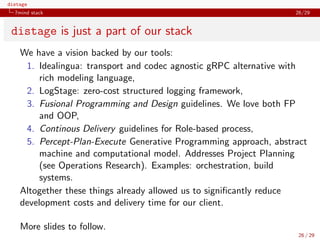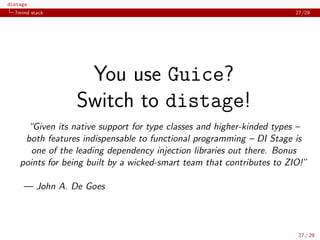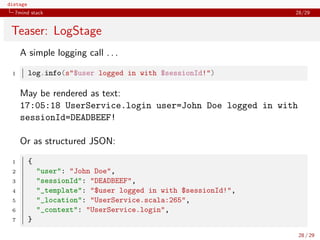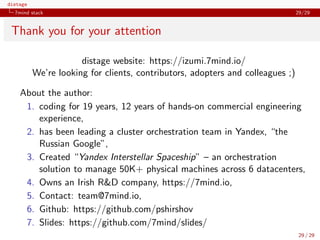Distage is a modern dependency injection framework designed for Scala, focusing on modular functional programming and minimizing context waste through efficient garbage collection. It addresses common criticisms of traditional dependency injection, such as performance and safety issues while supporting advanced features like dynamic plugins, circular dependency resolution, and lifecycle management for resources. The framework has been in production for over a year and continues to evolve, with future plans for additional features and improvements.
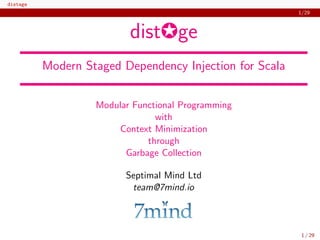
![distage
The argument: Dependency Injection vs. Functional Programming 2/29
DI is outdated and doesn’t compose with FP?
Many Scala folks think that:
1. DI is heavy and slow
◮ “tests start longer than they run”
2. DI is unsafe
◮ “my program compiles but crashes at runtime after a huge delay”
3. DI doesn’t work for modern FP code
◮ “we cannot inject IO[ , ] into Repository[ [ , ]] ”
4. DI is full of magic and error-prone
◮ “I’ve read 80% of the 5000-page Spring manual but still don’t
understand why I need to put these 12 annotations here. I’ve tried
Guice but it failed with 10-megabyte stacktrace after five minutes
and 300 retries of database connection initialization”
2 / 29](https://image.slidesharecdn.com/distage-scalaua-190330093438/85/ScalaUA-distage-Staged-Dependency-Injection-2-320.jpg)
![distage
The argument: Dependency Injection vs. Functional Programming 3/29
TLDR
1 import distage._, scalaz.zio.IO
2
3 trait Repository[F[_, _]]
4 class ProductionRepository[F[_, _]] extends Repository[F]
5 class DummyRepository[F[_, _]] extends Repository[F]
6 class App[F[_, _]](repository: Repository[F]) { def run = ??? }
7
8 class MyAppProd[F[_, _]: TagKK] extends ModuleDef {
9 make[Repository[F]].from[ProductionRepository[F]]
10 make[App[F]]
11 }
12 class Main[F[_, _]: TagKK: BIO] extends App {
13 Injector()
14 .produceF[F[Throwable, ?]](
15 new MyAppProd[F], roots=Set(DIKey.get[App[F]])
16 ).use(_.get[App[F]].run)
17 }
18 object Main extends Main[IO]
3 / 29](https://image.slidesharecdn.com/distage-scalaua-190330093438/85/ScalaUA-distage-Staged-Dependency-Injection-3-320.jpg)
![distage
distage features 4/29
distage: overview
1. Staging: plan all the work before you do anything,
2. Garbage Collection: instantiate reachable instances only,
3. Higher-Kinded Types: inject typeclass instances, use parametricity,
4. Path-Dependent Types support,
5. Lifecycle and Resources: inject any cats.effect.Resource[F, A],
6. Plan introspection: graphviz, text dump, dependency trees,
7. Plan rewriting,
8. Roles: multiple services in one process,
9. Dynamic Plugins1 and Testkit,
10. Circular Dependencies support,
11. Assisted Injection and Trait Augmentation2,
12. Automatic Sets: prepopulate sets with all instances of a class
1
Runtime with compile-time verification
2
Runtime or compile-time generation
4 / 29](https://image.slidesharecdn.com/distage-scalaua-190330093438/85/ScalaUA-distage-Staged-Dependency-Injection-4-320.jpg)
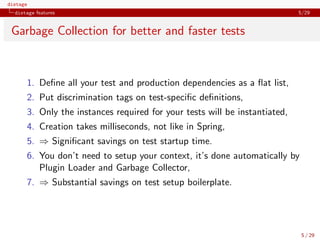
![distage
distage features 6/29
Example: Garbage Collection and tests
1 class ProductionRepository[F[_, _]] extends Repository[F]
2 class DummyRepository[F[_, _]] extends Repository[F]
3
4 class MyAppPlugin extends PluginDef {
5 make[Repository[IO]].from[ProductionRepository[IO]]
6 make[Repository[IO]].tagged("test").from[DummyRepository[IO]]
7 }
8 class RepoTest extends DistagePluginSpec {
9 "repository" must {
10 "work correctly" in diIO {
11 (repository: Repository[IO]) => // repository is GC root
12 // Repository is DummyRepository - "test" tag prioritized
13 // ProductionRepository will not be instantiated!
14 for { kv <- randomIO[KeyValue]
15 _ <- repository.put(kv)
16 kv2 <- repository.get(kv.key)
17 } yield assert(kv == kv2)
18 }}}
6 / 29](https://image.slidesharecdn.com/distage-scalaua-190330093438/85/ScalaUA-distage-Staged-Dependency-Injection-6-320.jpg)
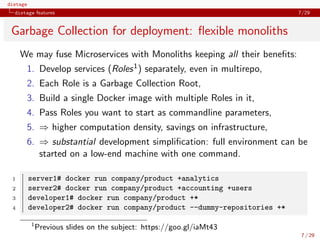
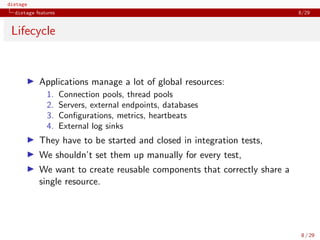
![distage
distage features 9/29
Lifecycle: .fromResource
1. Inject any cats-effect Resource
2. Global resources deallocate when the app or test ends
1 object App extends IOApp {
2 val blazeClientModule = new ModuleDef {
3 make[ExecutionContext].from(ExecutionContext.global)
4 addImplicit[Bracket[IO, Throwable]]
5
6 make[Client[IO]].fromResource { ec: ExecutionContext =>
7 BlazeClientBuilder[IO](ec).resource
8 }}
9
10 def run(args: List[String]): IO[ExitCode] =
11 Injector().produceF[IO](blazeClientModule)
12 .use { // Client allocated
13 _.get[Client[IO]].expect[String]("https://google.com")
14 }.as(ExitCode.Success) // Client closed
15 }
9 / 29](https://image.slidesharecdn.com/distage-scalaua-190330093438/85/ScalaUA-distage-Staged-Dependency-Injection-9-320.jpg)
![distage
distage features 10/29
Effectful creation: .fromEffect
Global mutable state must be created effectfully, but doesn’t have to
be deallocated. e.g. a global parallelism limiter:
1 import distage._, import scalaz.zio._
2
3 case class UploadConfig(maxParallelUploads: Long)
4
5 class UploaderModule extends ModuleDef {
6 make[Semaphore].named("upload-limit").fromEffect {
7 conf: UploadConfig @ConfPath("myapp.uploads") =>
8 Semaphore.make(conf.maxParallelUploads) }
9 make[Uploader]
10 }
11 class Uploader(limit: Semaphore @Id("upload-limit")) {
12 def upload(content: Content): IO[Throwable, Unit] =
13 limit.withPermit(...)
14 }
10 / 29](https://image.slidesharecdn.com/distage-scalaua-190330093438/85/ScalaUA-distage-Staged-Dependency-Injection-10-320.jpg)
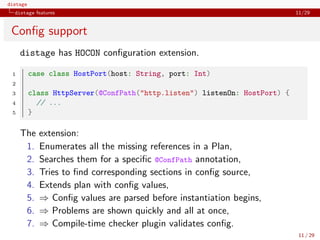
![distage
distage features 12/29
Dynamic Plugins
Just drop your modules into your classpath:
1 class AccountingModule extends PluginDef {
2 make[AccountingService].from[AccountingServiceImpl]
3 // ...
4 }
Then you may pick up all the modules and build your context:
1 val plugins = new PluginLoaderDefaultImpl(
2 PluginConfig(Seq("com.company.plugins"))
3 ).load()
4 // ... pass loaded modules to Injector
1. Useful while you are prototyping your app,
2. In maintenance phase you may switch to static configuration.
12 / 29](https://image.slidesharecdn.com/distage-scalaua-190330093438/85/ScalaUA-distage-Staged-Dependency-Injection-12-320.jpg)
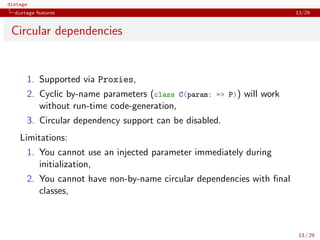
![distage
distage features 14/29
Trait Augmentation
1 trait UsersService {
2 protected def repository: UsersRepo
3
4 def add(user: User): Unit = {
5 repository.put(user.id, user)
6 }
7 }
We may bind this trait directly, without an implementation class:
1 make[UsersService]
1. Corresponding class will be generated1 by distage,
2. Abstract defs will be wired with values from the object graph,
1
both runtime and compile-time cogen supported
14 / 29](https://image.slidesharecdn.com/distage-scalaua-190330093438/85/ScalaUA-distage-Staged-Dependency-Injection-14-320.jpg)
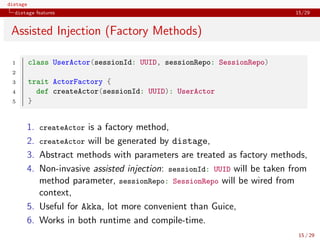
![distage
distage features 16/29
Extension: Automatic Sets
1. All instances of type T (like AutoCloseable) as a Set[T],
2. Strong and Weak References:
◮ GC collects weak referenced members with no more references
Example: basic lifecycle support: (please use Resource bindings in real
apps!)
1 trait Resource {
2 def start(): Unit
3 def stop(): Unit
4 }
5 trait App { def main(): Unit }
6 locator.run { (resources: Set[Resource], app: App) =>
7 try {
8 resources.foreach(_.start())
9 app.main()
10 } finally { resources.foreach(_.close()) }
11 }
16 / 29](https://image.slidesharecdn.com/distage-scalaua-190330093438/85/ScalaUA-distage-Staged-Dependency-Injection-16-320.jpg)
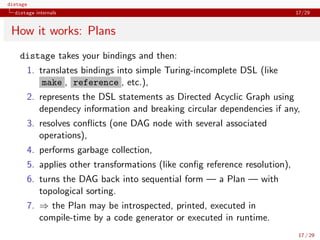
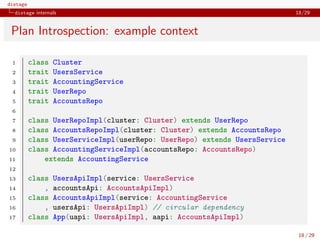
![distage
distage internals 19/29
Plan Introspection: example bindings1
1 val definition = new ModuleDef {
2 make[Cluster]
3 make[UserRepo].from[UserRepoImpl]
4 make[AccountsRepo].from[AccountsRepoImpl]
5 make[UsersService].from[UserServiceImpl]
6 make[AccountingService].from[AccountingServiceImpl]
7 make[UsersApiImpl]
8 make[AccountsApiImpl]
9 make[App]
10 }
11 val injector = Injector()
12 val plan = injector.plan(definition)
1
Full code example: https://goo.gl/7ZwHfX
19 / 29](https://image.slidesharecdn.com/distage-scalaua-190330093438/85/ScalaUA-distage-Staged-Dependency-Injection-19-320.jpg)
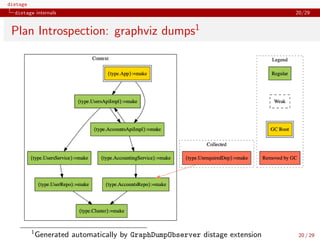
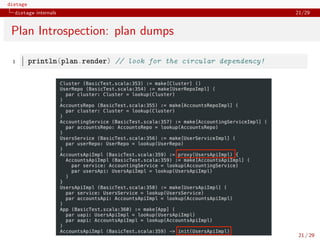
![distage
distage internals 22/29
Plan Introspection: dependency trees
You may explore dependencies of a component:
1 val dependencies = plan.topology.dependencies
2 println(dependencies.tree(DIKey.get[AccountsApiImpl]))
Circular dependencies are marked with a circle symbol.
22 / 29](https://image.slidesharecdn.com/distage-scalaua-190330093438/85/ScalaUA-distage-Staged-Dependency-Injection-22-320.jpg)
![distage
distage internals 23/29
Compile-Time and Runtime DI
A Plan:
1 myRepository := create[MyRepository]()
2 myservice := create[MyService](myRepository)
May be interpreted as:
Code tree (compile-time):
1 val myRepository =
2 new MyRepository()
3 val myservice =
4 new MyService(myRepository)
Set of instances (runtime):
1 plan.foldLeft(Context.empty) {
2 case (ctx, op) =>
3 ctx.withInstance(
4 op.key
5 , interpret(action)
6 )
7 }
23 / 29](https://image.slidesharecdn.com/distage-scalaua-190330093438/85/ScalaUA-distage-Staged-Dependency-Injection-23-320.jpg)
